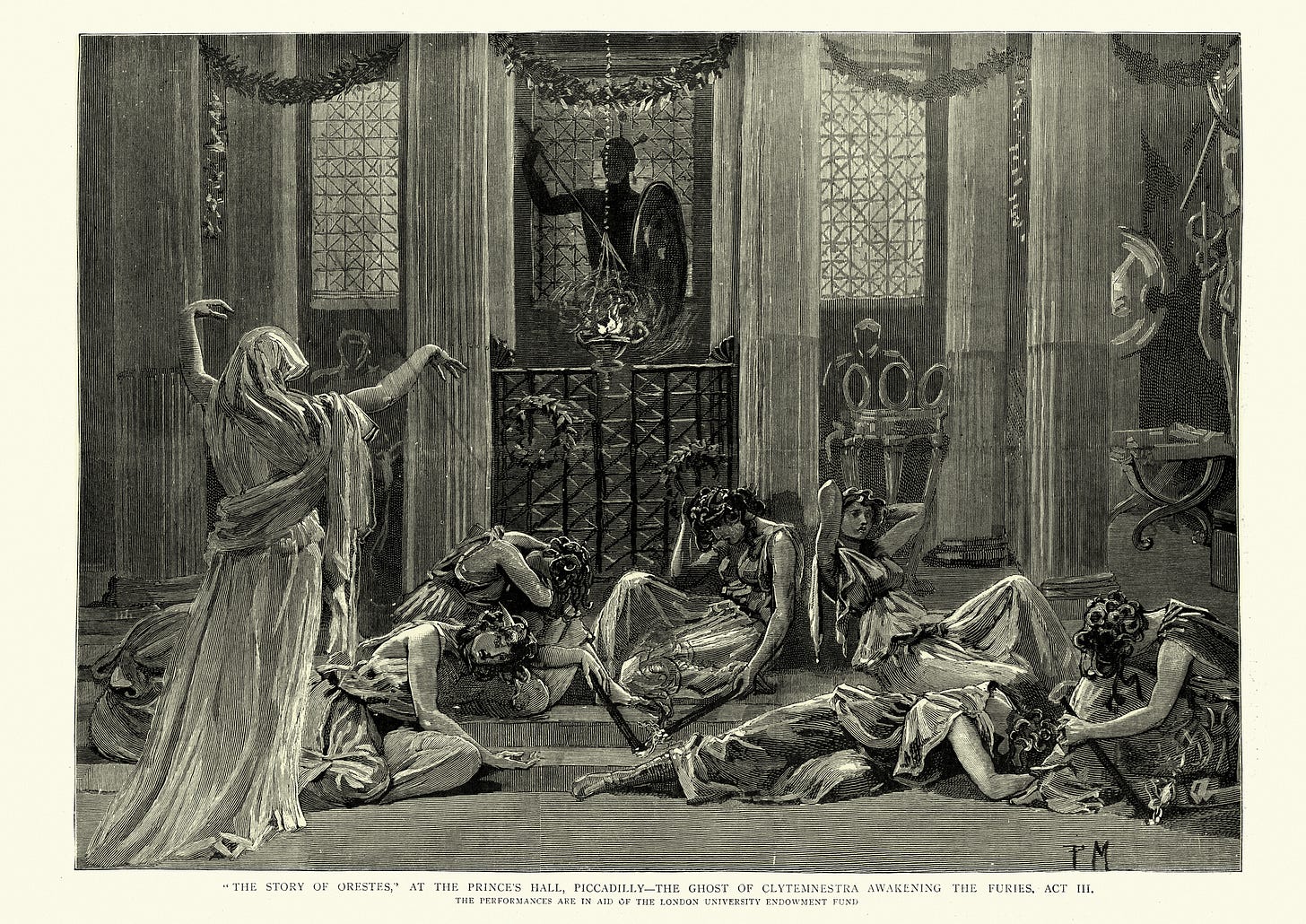Three Brothers Walk Into a Spiritual Journey
How The Darjeeling Limited Teaches Us What We Already Know.
As a rule, I don’t like to cry at movies. I am not in the habit of wearing waterproof mascara, and I usually get the hiccups about 5 minutes in. Apparently I talk too much during movies, so I can only imagine what repeated diaphragm spasms would make my companions feel. But there is one movie I will willingly cry at, and it’s not just because I have a crush on Adrian Brody.
“Wes Anderson” has become a shorthand for symmetrical, pastel, whimsically curt movies, an aesthetic one would figure was better suited to a 20th-century dollhouse than your local Regal cinema. I adore them. I’ve seen 2001’s The Royal Tenenbaums countless times, but 2012’s Moonrise Kingdom might be my favorite. The score will inspire modern dance in the most curmudgeonly among us.
Anderson’s movies are pretty, which seems like it should be an insult. It isn’t. They’re a steady layer of sad, but not in a flat way. They reflect the full gamut of human emotion through a picturesque lens that we can never actually attain. The movies are beautiful, but the people aren’t. Internally, the people aren’t beautiful, at least. Most of the actors are pretty good-looking.
Possibly the saddest of them all is The Darjeeling Limited, which is strange since The Life Aquatic with Steve Zissou is largely about a man eaten by a shark, or as I describe it, Moby Dick for the girls. (This is not to say that Moby Dick is not for the girls, but that The Life Aquatic definitely is.)
Three brothers, estranged for a year after their father’s death, set off on a trip across India at the behest of the oldest brother, who is determined that they should go on a spiritual journey. While poking fun at the subset of white men who take a train trip across India for expressly spiritual purposes, Anderson knows that at any point, we are only one great loss away from becoming our own version of train-traveling white men.
It is a simple movie and one that does not pretend to be otherwise. It tells you what it is at the beginning, in the way that a movie about three brothers on a train trip does. At Owen Wilson’s insistence that they commence a spiritual bonding through a detailed (and laminated) itinerary encompassing India’s most famous spiritual landmarks, it whispers to you that the answers will not lie on their timetable or even the train’s.
The resolution is clear from the start: the brothers will reunite, the spiritual experiences will happen when their plans go awry, and while they may never get over their father’s death, time will go on, and so will they. This isn’t a spoiler. You know that the movie seems to be playing against Wilson’s wishes but ultimately fulfills them. It’s not a twist; it isn’t a surprise. That’s the whole point.
The Plot Is Coming Round The Mountain When It Comes, When It Comes
In every introductory writing class I have taken (and I have taken a lot), there is a discussion of dramatic arcs. Generally, western storytelling can be organized in a diagram that looks like a lopsided mountain: the inciting incident, a fancy word for the beginning, starts a gradual slope, conflict and rising action continue the slope until the mountain is peaked with the
climax. Falling action and the denouement, or the resolution/conclusion (depending on what medium you’re in), take the mountain back down, landing the audience on solid ground, firmly on the other side.
And in every writing course I have taken (even more than the introductory ones, if you can believe it), there is always a discussion about the predictability of this model. One of the terrible things about studying writing is that you become unable to read or watch anything without the overlay of dramatic structure. (If you look closely, you can see what section of the mountain I’m on right now.) I am an absolute pain to watch movies with, in part because I am unable to keep my mouth shut but also because I can tell you, in general terms, what’s going to happen next.
Most people think this is a bad thing. I’m not sure about that. So, of course, it’s time to talk about the Greeks.
Ancient Greek theater, the foundation of Western drama, was basically reruns. Audiences usually knew the stories they would see, partly because the Greeks had a fun habit of not writing new stories. (They did write new stories, I know this, I just had to keep reading the same ones over and over.) So when audiences went to see Oedipus Rex performed at various festivals, they weren’t going for the shock of the third act surprise. What were they going for? They were still going for the third-act surprise…even though they knew it was coming.
Catharsis is at the foundation of Greek drama and, arguably, all drama. Catharsis, which translates to some form of “cleansing,” is the idea that theater produces a buildup of emotion, which is then cleansed from the audience through the climax and resolution of the story. Aristotle argued that tragedy, in particular, was good for the human body since watching a hero’s downfall forced a cathartic and empathetic response, which he thought would prevent people from making the same mistakes (it doesn’t).
Plato’s original vision for dramatic catharsis had a different edge. Plato thought that catharsis took the human soul and separated it from the body, elevating it into a higher plane. That emotional cleansing that Aristotle talked about was a spiritual ascension for Plato. To experience the dramatic, to allow empathy and projection to overtake the human body, was more than any human could ever be on their own.
By the end of Oedipus Rex, the audience learns that Oedipus has married and had children with his mother and killed his father. As a result, he blinds himself and begs his brother-in-law/uncle to banish him from Thebes. Perfectly reasonable if you ask me. Oedipus gouges his eyes out, and we’re treated to a cathartic experience: a spiritual ascension of morals, virtues, and cleanliness close to godliness. And we’re treated to it repeatedly (if you’re an Ancient Greek or majoring in theater).
The lovely thing about catharsis is that it happens again and again, even if you’ve gone through it before. Even if you know what’s coming—or maybe more so, in fact.
The Royal Platonists
Back to Wes Anderson. I wonder what Plato and Aristotle would think of his movies. My guess is they would say “entirely too many women,” which no one else has ever said about Wes Anderson movies.
The first time I watched The Darjeeling Limited, back in high school, I had a sense of both the dramatic arc and the eventual catharsis within the first few minutes. This wasn’t because I was especially smart in high school but because Anderson gives you everything you need.
You have three estranged brothers, unresolved trauma, and a very strict list of spiritual places they absolutely must visit. Of course, you know what’s going to happen. It’s just like Oedipus. Well, not entirely like Oedpius. Both feature a dead father, but the plot similarities end there.
There’s a clear order of people who figure out what’s happened in Oedipus Rex: the audience, Oedipus’ wife, Oedipus.
Because first-time viewers find out prior to the relevant characters, and repeat viewers know from the beginning, the catharsis isn’t watching a man find out that his entire life is a lie and take violent action to save his city. The catharsis is knowing that Oedipus cannot run from his fate, and you have to watch him try anyway. He will end it in the only way he can, bloody and alone, just how his parents left him as a baby.
In the same way, The Darjeeling Limited lets the audience know where they’re going before the characters. The brothers start raw, in fraternal disarray, and the audience is handed the keys to their eventual reconciliation. Much like Oedipus, the catharsis comes not from the emotional journey that they go on, as well as the physical one, but rather from knowing that they have to bumble around the Indian subcontinent, they have to fight and argue and get robbed before they can reach their peak and stumble the way down.
My favorite scene in The Darjeeling Limited might be the saddest, and I feel no remorse for spoiling it. Kicked off of the train, the brothers walk along a river, carrying their monogrammed luggage, when they come across three young brothers drowning in the river. In a beautiful series of shots, they drop the suitcases and race into the river, each grabbing a child and hauling them to safety—all except Adrian Brody and his child, who gets swept away down the river. The boy dies after hitting a rock, and Brody carries his small body out of the water. He says, “I didn’t save mine.”
I cry every time. I’m crying now. I know what’s happening; I know that the loss of a child is another step towards processing his father’s death and the responsibilities of the upcoming birth of his son; I know that Brody’s character has to withstand another death before he can heal from the first one, I know that I’m crying because I can’t help him, I can’t help him just like he couldn’t help the little boy.
And for the first time in my life, I think I get what Plato was talking about. Watching that scene, as many times as I have, still feels like I’m on the road to something spiritual. I know what’s happening; I’ve known since the beginning. And when the brothers figure themselves out, and their wounds, if not healed, are at least not festering anymore, it still takes me out of what I am. The more times I watch it, the more I feel cleansed.
Shock value is great. I am a huge fan of it. But the remarkable thing about cathartic drama is the way that it will take hold of you every time, the way that it will bring you out of yourself. It doesn’t matter that the arc was obvious, that the catharsis was clear from the beginning. If anything, it makes the eventual denouement even more powerful. Anderson took an old cliche, the cinematic equivalent of “a watched pot never boils” or “when God closes a door, he opens a window,” and makes it an ascendance into something sublime.
Everyone knows that life never goes as prescribed; everyone knows that what you want may find you if you make yourself open to it. But after The Darjeeling Limited, you always feel like you understand it a bit more, like a new translation of a favorite poem.
Anderson’s movie could have been hokey, and maybe to some, it is. But he does something magnificent with it, not just reminding the audience that there is more to life than a timetable or itinerary. He gives you three brothers on a clear, simple path, and he tells you to cry. He tells you to let it out and leave the theater or your couch, wherever you are watching and then lets you go. He doesn’t try to change your behavior like Aristotle thought he should. He roughs you up a bit, cleans you, and sends you off with a pat on the head. You can do what you like with your catharsis, he says, but what you like may not happen. And in that way, perhaps, life is like the movies. Or Oedipus Rex. But only in that one aspect, hopefully.








